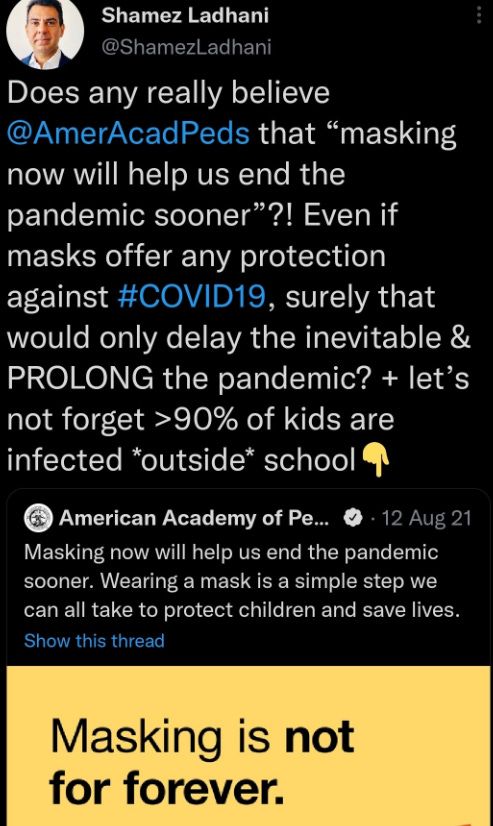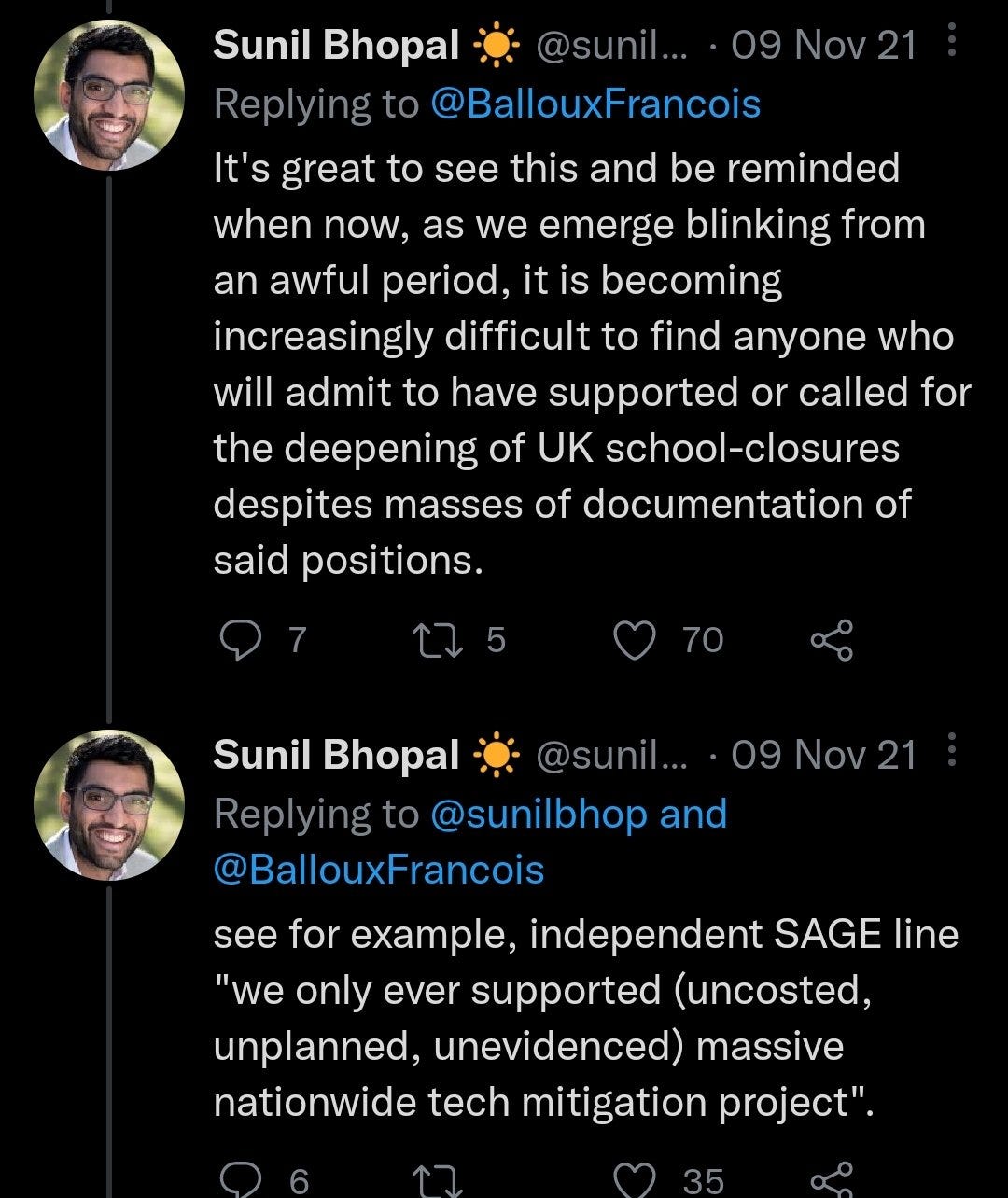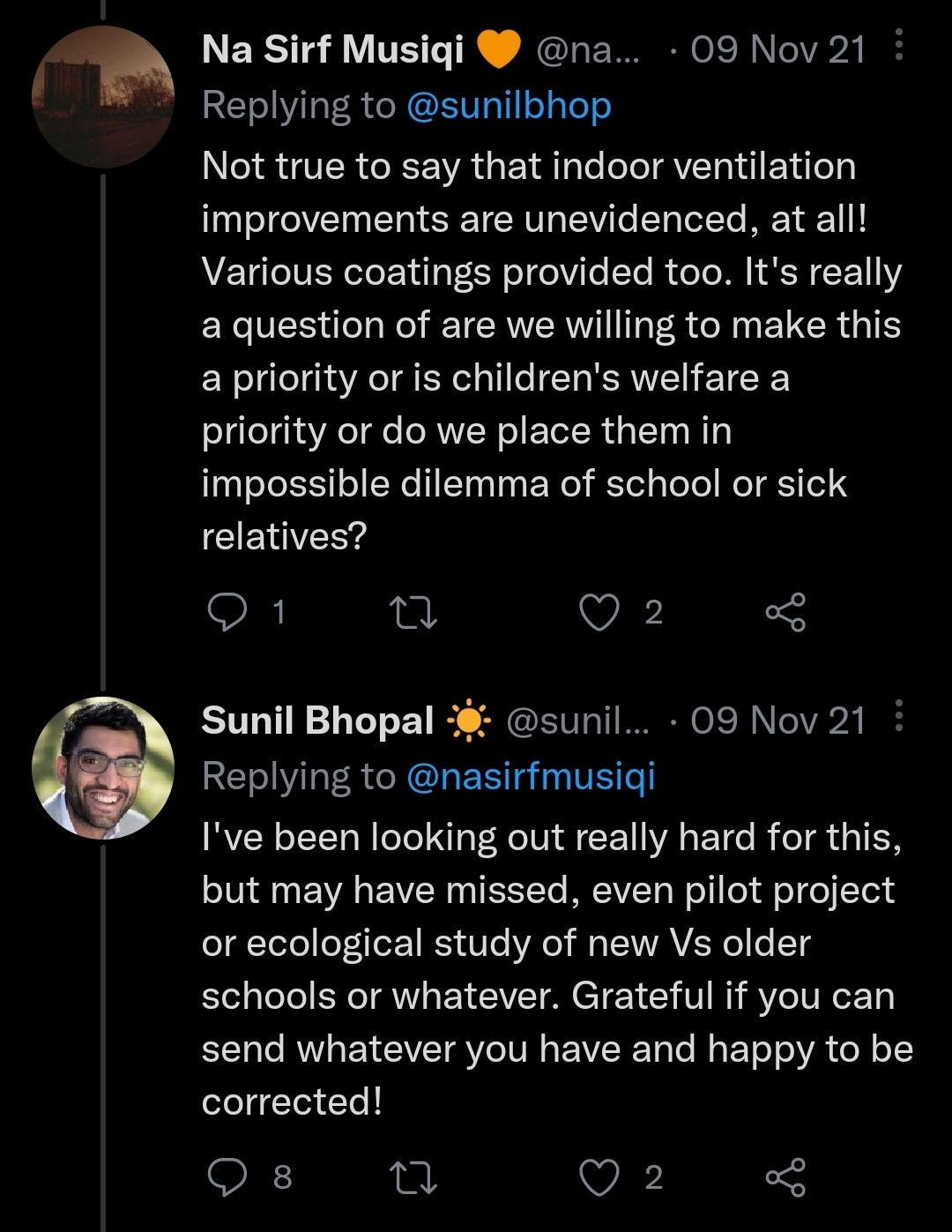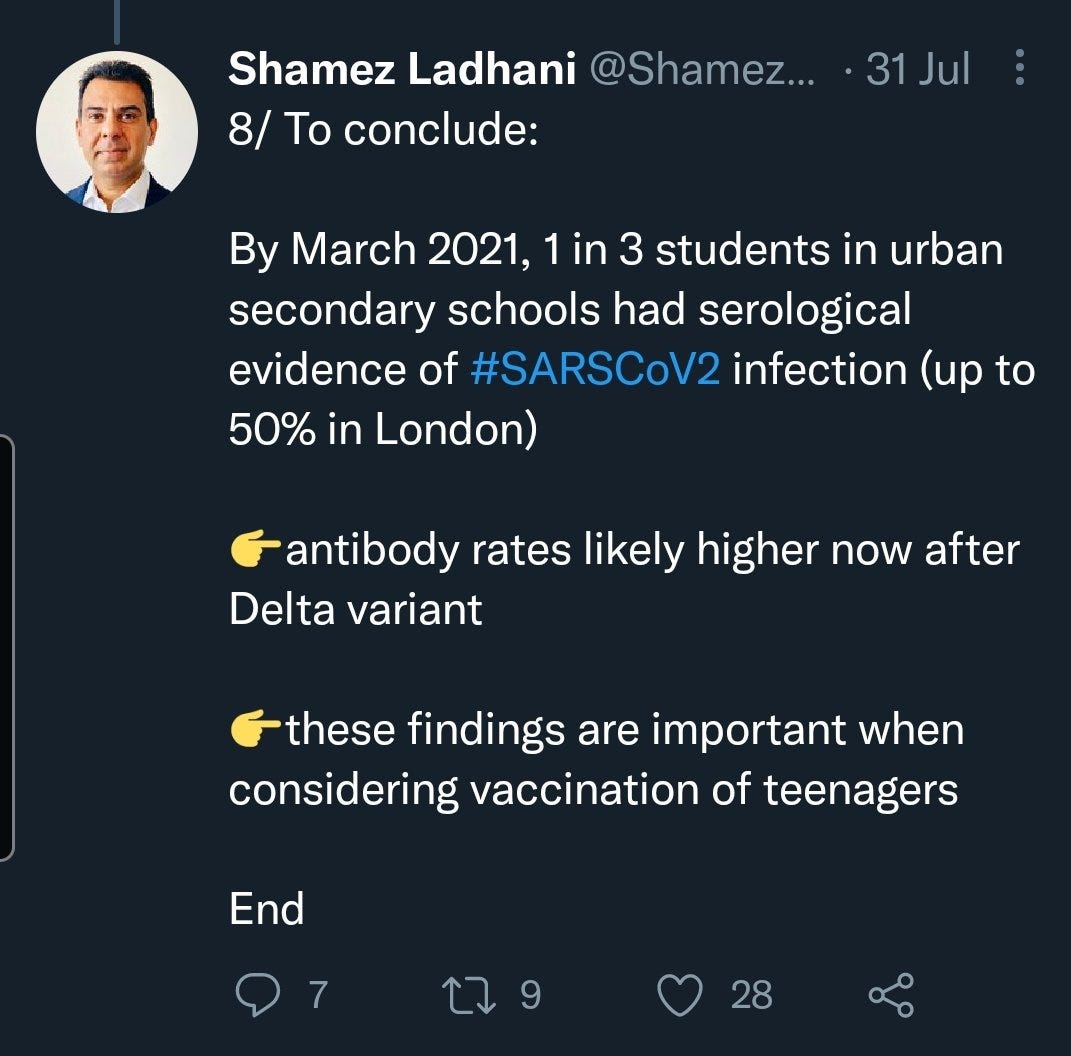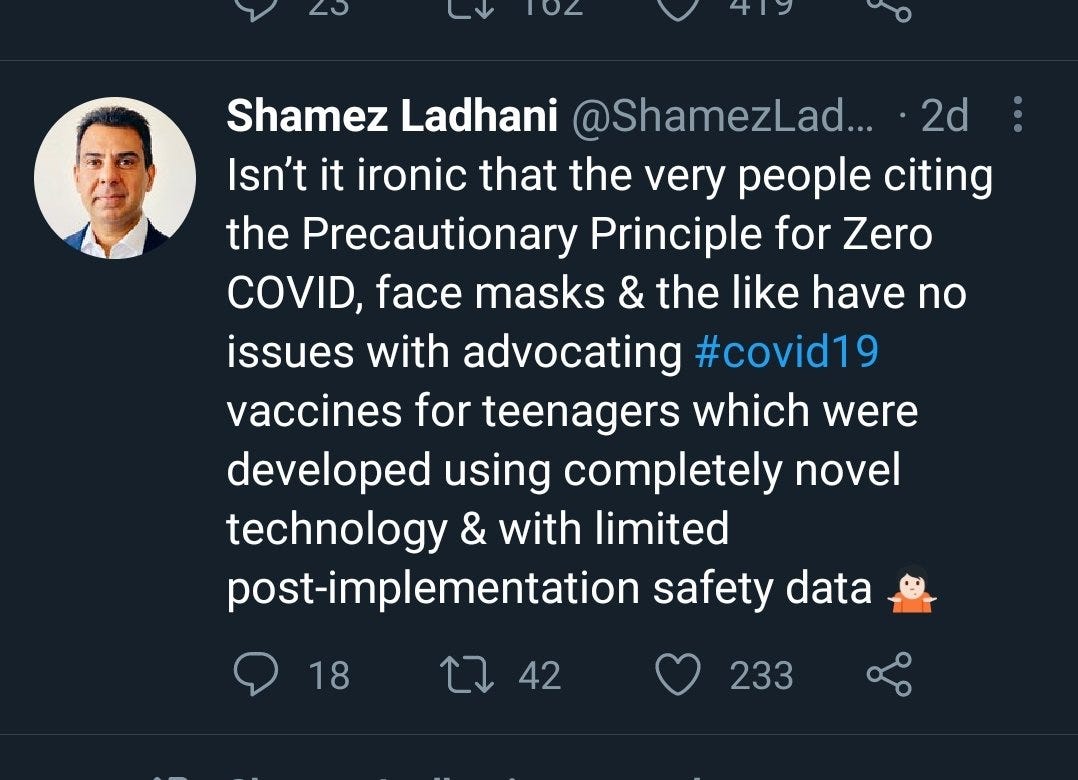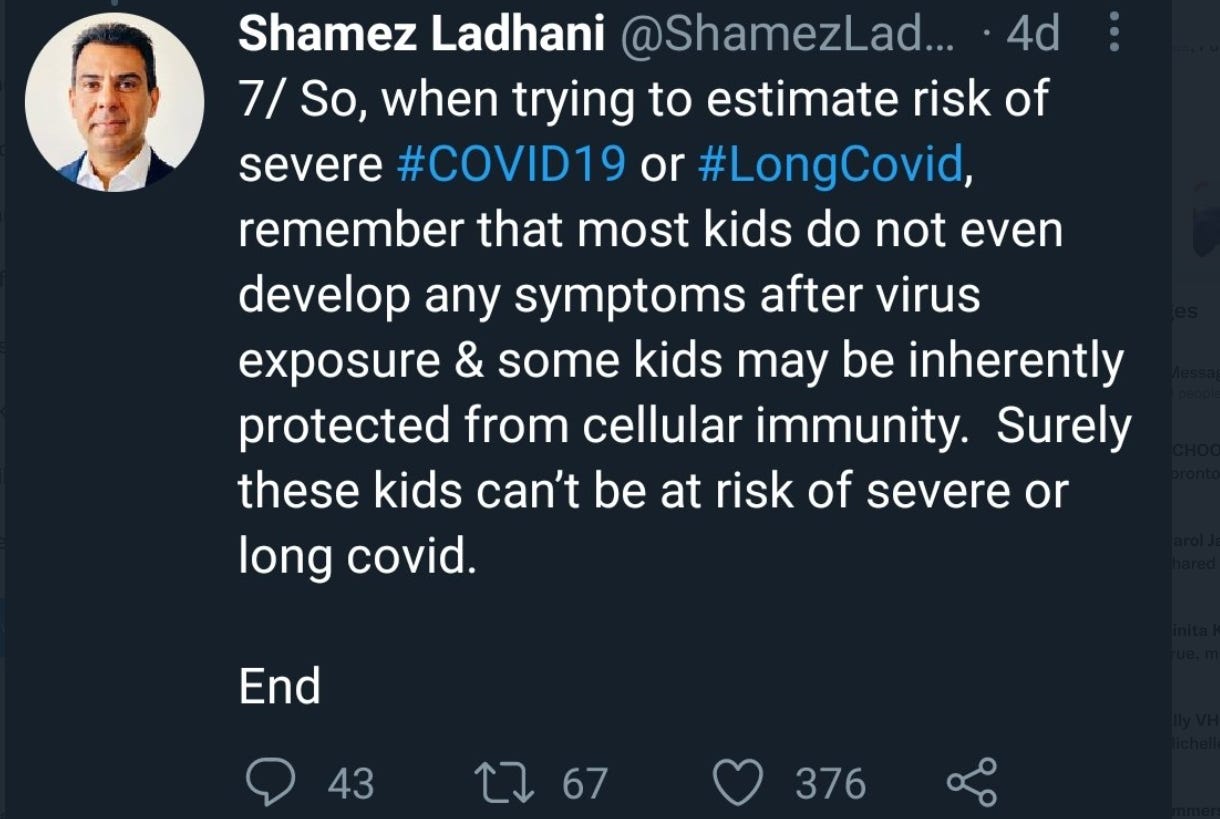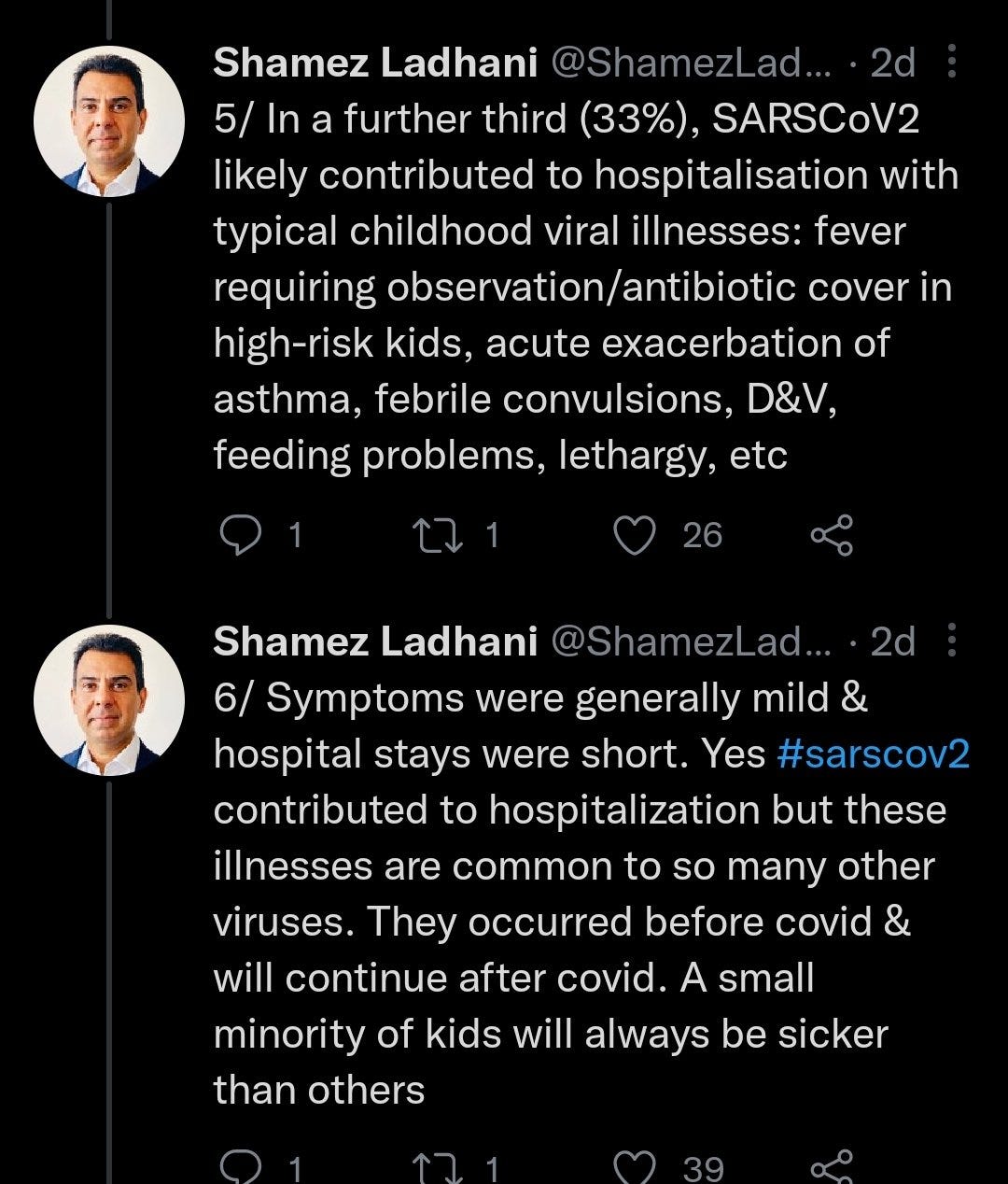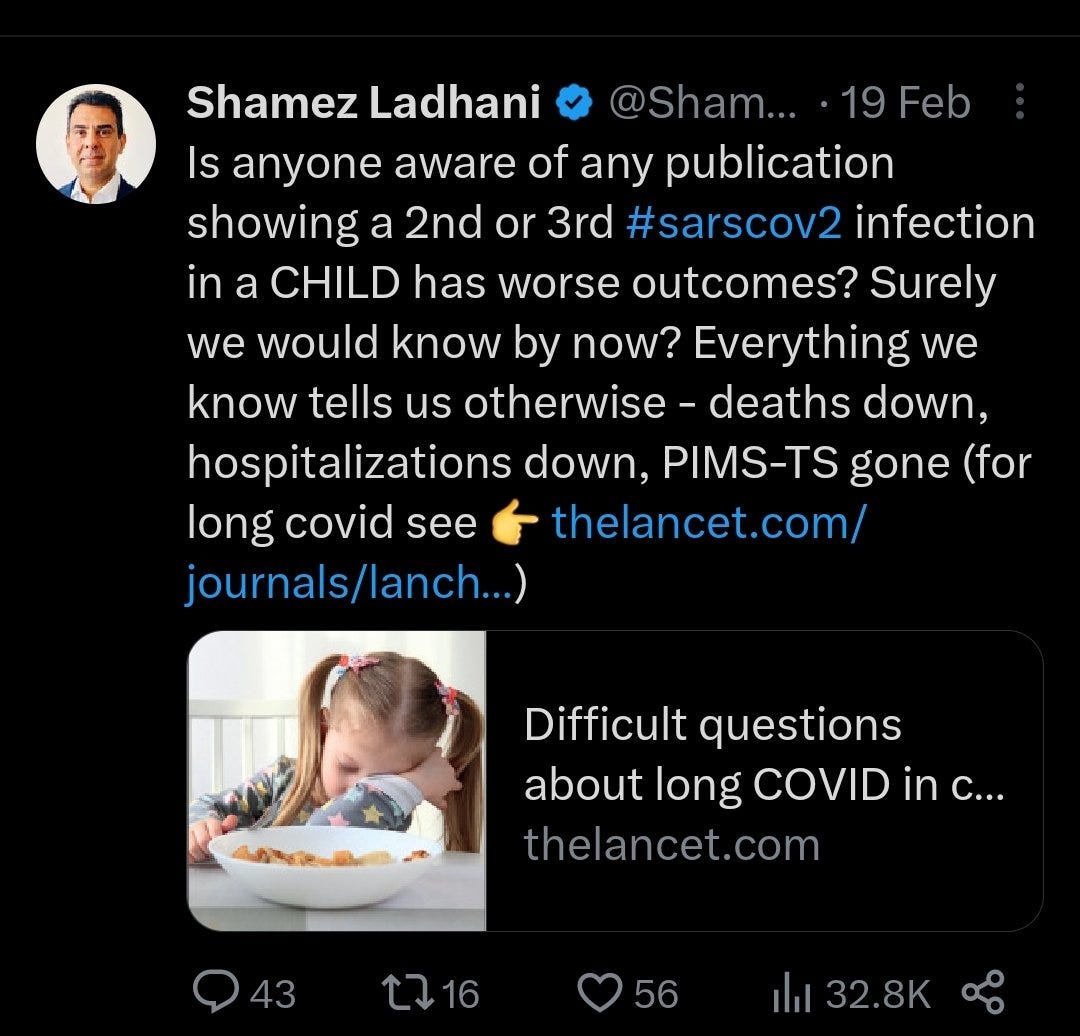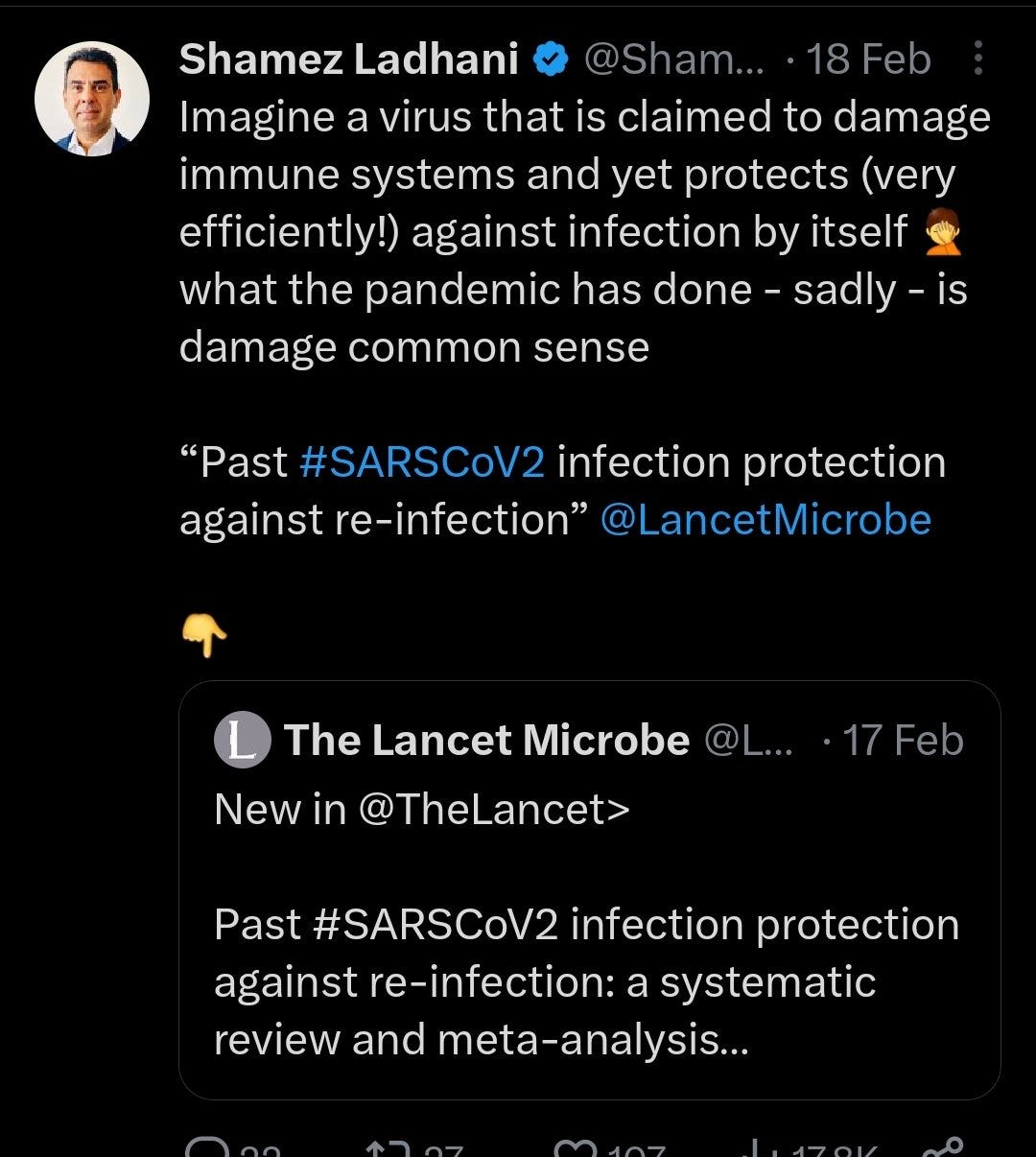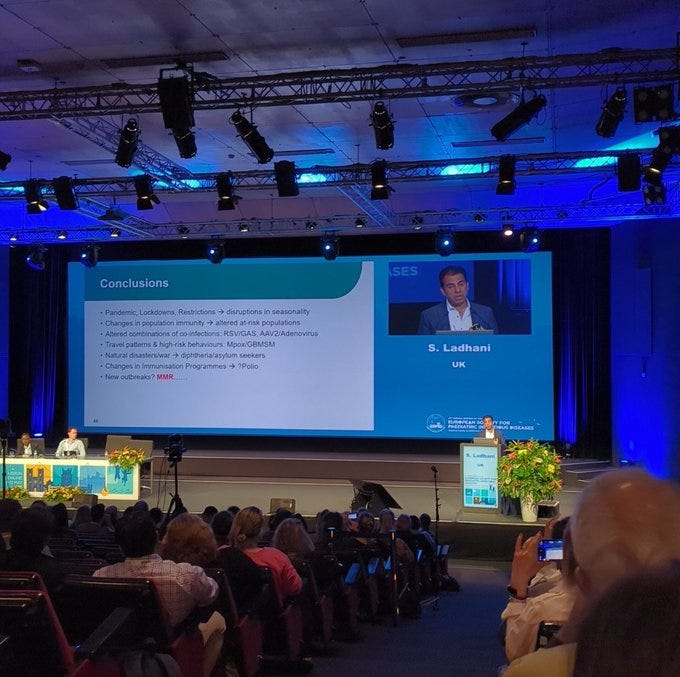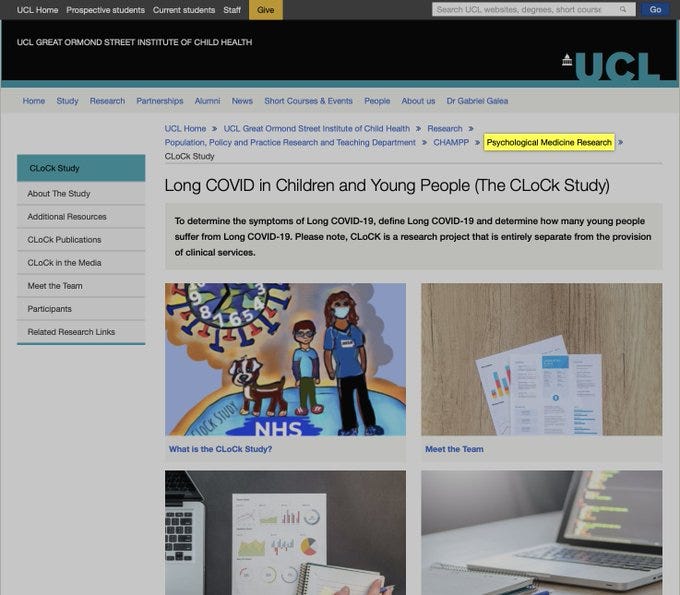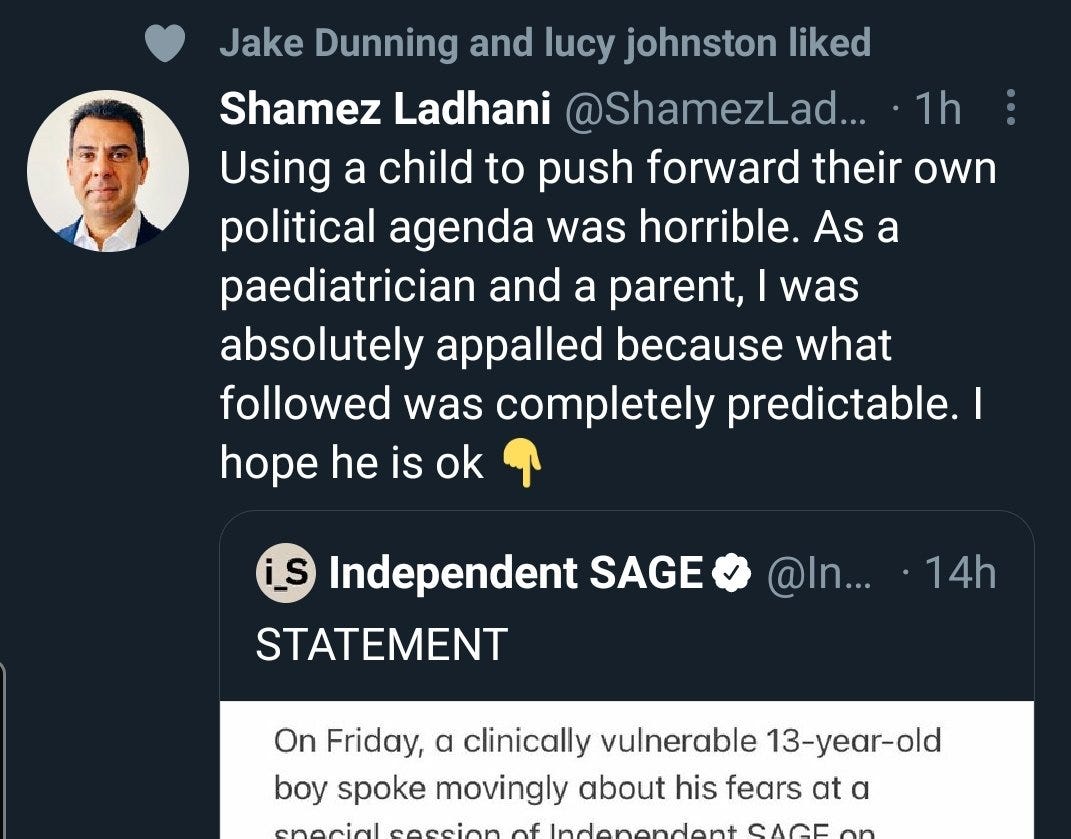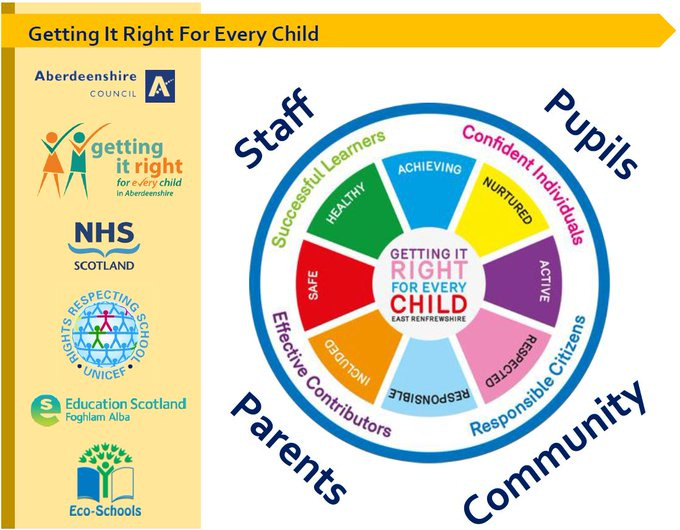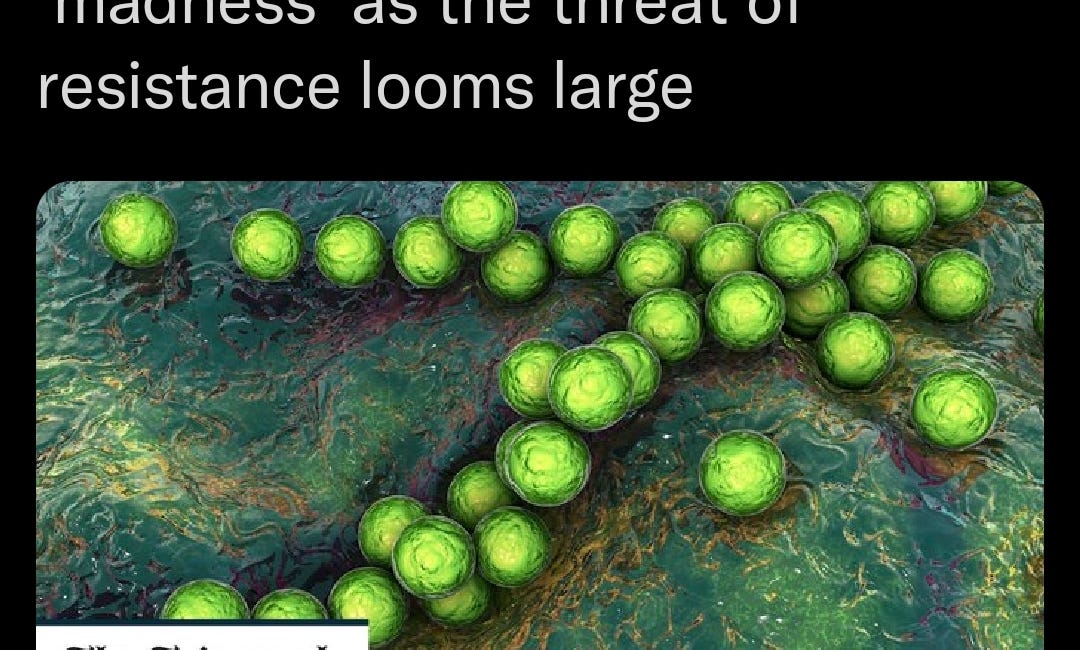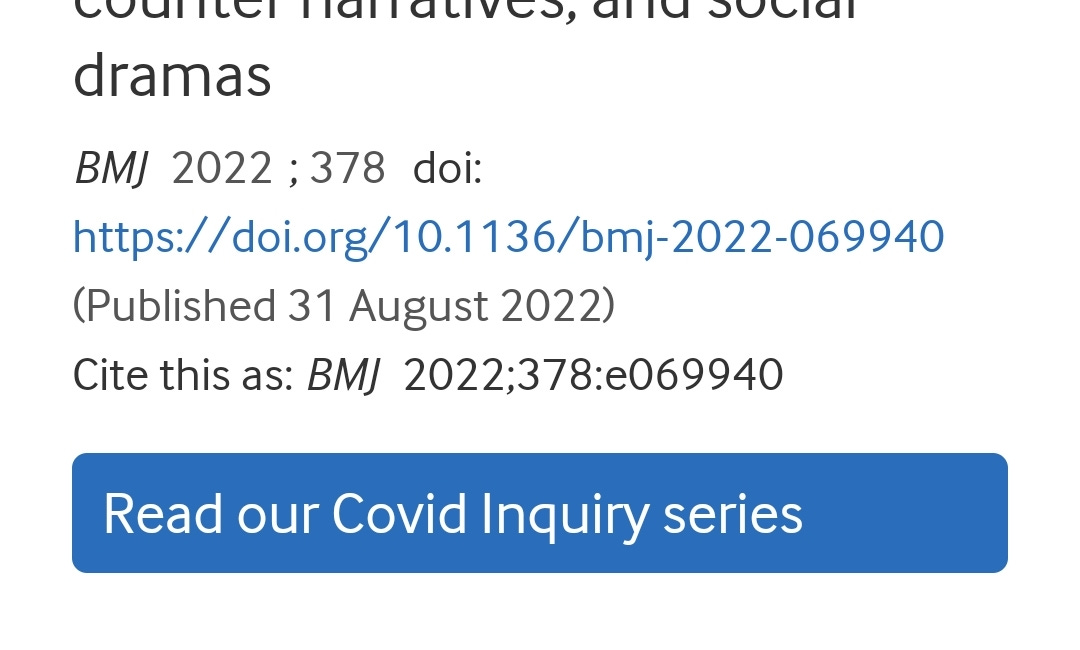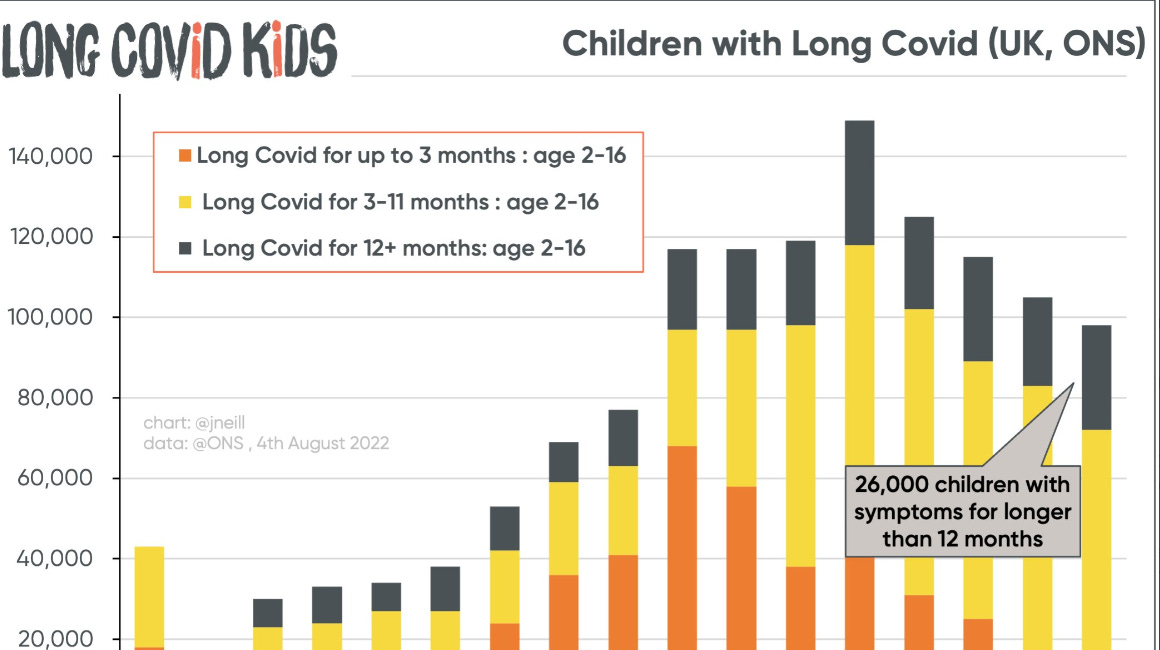Long Covid in children:"Substantial impact" from Omicron infections & reinfections
Latest UK paeds study ignored by media
A study published on 10 May 2023 concluded that,
“Our predominant, and actionable, finding is that children and youth with long COVID following likely infection with Omicron (both first infection and reinfection) have a similar profile to CYP with long COVID after infection with other variants and that substantial numbers of CYP are likely to be impacted.”
There have been other studies that have warned about long covid in children, however what makes this paper different is the authors, this is the CLoCK Consortium, the UK’s main team working on long covid prevalence rates in children which includes Shamez Ladhani, the UK’s clinical lead on covid in children.
The UKHSA team has previously been accused by some academics and clinicians of downplaying the risk of long covid in children. Government advisers appear to have a relaxed attitude to infections in children.
A look at some previous contributions from those working with the UK Government. At first they told us children rarely get infected and are less likely to transmit.
Once it was established children were much more likely to catch SARS2 than be hit by a bus, the official line became that while children were being infected, the vast majority of infections occurred outside of school.
An ONS paper found children were more likely to be an index case, play dates and sleepovers were suggested as the cause, not schools.
Ventilation and air filtration was dismissed by members of the RCPCH as being unproven and too expensive.
This is despite the RCPCH calling for major regulation and investment on improving air quality in classrooms.
Link below to the full report.
When it came to vaccination it was argued that high infection rates made it unnecessary.
The efforts to argue that children wouldn’t benefit from vaccination led to the UK’s clinical lead on covid in children adopting phrases that made them popular with anti-vaxxers.
Official line on long covid
A look at a previous study on long covid and what the official line has been up until now.
From another study
The latest study from the CLoCK consortium begins by estimating that over 90% of children and young people have now been infected with large numbers of primary infections and reinfections. ONS infection survey data suggests the average number of infections per child is two.
The authors state that its critical to understand the long-term impact of infection, warning that the scale of Omicron reinfections indicates “there could be an unprecedented impact and demand for services.” So now that the damage has been done, its time to count the damage, this seems inverse to the precautionary principle, however Ladhani has previously argued that the damage of mitigations are well known and so should be prioritised in preventing than the unknowns of covid. There is little in the way of hard data to directly link many mitigations to harms, most papers on the subject have relied on anecdotes or correlations with demand for mental health services.
The conclusion of the result is that the impact of long covid on children is likely to be substantial as reinfections continue. This should be a matter of great concern for everyone, it should also lead those who were relaxed about infections in children to reconsider their previous comments.
The papers findings that reinfections can cause substantial numbers of long covid cases is a major blow for those who suggested that children would have a broad robust immunity after infection that would prevent harm from future infections.
Unfortunately this paper hasn’t received any media attention, unlike more reassuring papers by the same team that got considerable coverage. A check of the authors’ Twitter accounts show they haven’t even shared their own paper, which they have always done previously. Surely a risk of harm to a large number of children should be deemed at least as news worthy as papers that estimated harms were rare.
This paper was published just before the European Society for Paediatric Infectious Disease’s (ESPID) annual conference in Lisbon, which would have been an ideal opportunity to alert the international paediatric community to the findings. Ladhani sits on ESPID’s international board and led a session at the conference.
The much criticised claim that lockdown impacted immune systems known as immunity debt was covered in Ladhani’s session, however the pandemic was spoken of in the past tense, there was no mention of his latest paper on the substantial impact of long covid.
While high profile members of the RCPCH haven’t directly shared the study, several have shared a thread criticising the study’s findings, a change from previous papers that were robustly defended by the same individuals. Of course with every argument there are counter arguments.
The implications of this study suggests the downplaying of the risk of covid to children has resulted in significant harms.
Debate will continue
Parents of children with long covid have fought for years now for greater recognition and resource into the condition. Many have complained about a lack of engagement from those paediatricians working with the government. CEV parents and those with vulnerable children have been taken to court and treated as being paranoid for doubting the official line on covid in children. There are already concerns regarding how new barriers may be put in front of them.
The discussion section of the new paper suggests that the definition of long covid used is too broad.
The paper also highlights the lack of understanding regarding why new cohorts experienced symptoms at 3 to 6 months. One area that campaigners have found disappointing is a lack of detailed discussion on potential mechanisms and biomarkers, internationally there is now a large research base regarding impacts of infection such as persistence and micro-clots.
The paper also discusses the need to determine whether long covid varied by vaccination status.
It should be noted that many of the government’s high profile advisers like Ladhani and Viner advocated against vaccinating children, and were involved in the JCVI meetings which initially decided not to offer vaccination to 12-15 year olds. The JCVI has since decided to end the offer of vaccination to children. The deadline before primary vaccination is withdrawn for the majority of children is in the summer, and children who turn 5 from September 2022 onwards have not and currently never will be offered vaccination unless they have one of a narrow list of conditions.
Why was this decision made before studies on Omicron and long covid in children were published, and before any studies have been conducted regarding the impact of vaccination on the likelihood of developing long covid?
The claim children didn’t benefit from vaccination has been heavily exploited by anti-vaxxers to increase vax hesitancy. If the JCVI reversed the decision to wind down the vaccination programme due to to new evidence its possible that it will be more difficult to persuade much of the public of the need.
Concerns over suggested treatments
Concerns have also been raised by parents regarding the lack of potential treatments for their children. Those seeking treatment have complained that they have been directed towards graded exercise therapy, the idea that someone with long covid will recover by gradually increasing the amount of exercise they do has been proven to not work, and the additional strain often leads to an increase in the severity of symptoms.
Graded exercises has been a controversial treatment previously used for other conditions such as ME/CFS by those suggesting the condition is primarily psychological in nature. Those with concerns that long covid will be treated as psychological rather than physiological condition have noted that the CLoCK study is being run by University College London’s Psychological medicine research department.
Link to CLoCK June 2020 - September 2021
The CLoCK study suggested that long covid may be psychological in nature, caused by “lockdown” rather than viral infection. The earlier studies were included in the evidence base used to justify policy decisions to remove mitigations in schools, it will be interesting to see if this latest study will also impact policy decisions, however considering the lack of attention this paper has received its likely to be ignored unless campaigners are able to make it impossible to ignore.
Another cause for concern is that one of the CLoCK researchers is Esther Crawley who was involved in the controversial PACE study into graded exercise for ME/CFS. The PACE trials were heavily criticised by the UK’s ME Association.
Parents of long covid children have grown increasingly frustrated with the lack of support, recognition and engagement from government, paediatrics and education services.
For example when Independent SAGE interviewed a teenager with long covid and then the teenager faced abuse online from covid deniers the response of members of the RCPCH was to attack Independent SAGE for providing the teen a platform.
RCPCH members have criticised the American Association of Pediatricians, the CDC and now the WHO for highlighting the risk of covid to children.
An example from Scotland, of the abandonment families feel.
Its been over three years since the pandemic began and the paucity of interest in the condition in the UK is shocking, and so I encourage readers to support the charity Long Covid Kids.
Further Reading
UK to replace vax only with infection only strategy
The UK was one of the first countries to claim the pandemic was over, announcing “Freedom Day” on 19 July 2021 and then Living with Covid Day in 2022 which Sajid Javid the Health Secretary at the time declared the UK was “moving into endemicity” now that we had vaccines and other treatments as he declared the end of all measures.
Strep A in the UK, a mess of public health messaging
Strep A is making headlines in the UK, sixteen children and forty seven adults have died since September with the majority of children dying in recent weeks. Media seculation has been rife regarding why what is generally regarded as a common infection seems to be leading to more severe outcomes. UK Health Security Agency are currently investigating, a ne…
Child Covid Deaths: A Tale of Two Studies
Two papers on covid deaths in children have been released in the same week. Gurdasani et al Ladhani et al
"Immunity Debt"? Established 2021
Since 2021 Immunity debt has been used to explain why people, in particular children should be exposed to infectious diseases, the concept is that not being regularly exposed to pathogens their immune systems are unprepared when they do encounter them. The concept has been cited as a lockdown harm and as a reason why masks and in some cases even ventil…
BMJ study questions evidence behind UK schools policy
A study published in the BMJ has accused the UK Government of failing to prioritised children, setting out the harms physical and educational harms of a laissez-faire attitude to allowing high transmission rates in younger age groups.
The April 2020 review that set the narrative on children & transmission
Open schools build up immunity 12 March 2020: The UK public were told the government was pursuing a herd immunity strategy, those supporting a mass infection strategy suggested closing schools would be counter productive as the needed to stay open to help build up immunity. Contrarian commentators tried to persuade the public that a few thousand elderly…
The Swedish Deception - Report
This report looks at a number of studies and internal communications to examine the integrity of Sweden’s pandemic response. International role model? It’s difficult to know the extent to which one country influenced another, perhaps some found the confirmation bias they were looking for in those with similar strategy ideas. We do know that representative…
Study examines UKs failure on airborne transmission
After looking at the UKs pandemic response in schools the BMJ's covid inquiry series turns to the UKs resistance and inconsistent approach to airborne transmission As with other analysis of the UK response the reliance on a small narrow group of advisers was highlighted.
Expose: The Economic Argument & Rishi Sunak
Rishi Sunak, former Chancellor and most likely to be failed leadership candidate for the Conservative Party leadership’s interview with the Spectator is being paraded as a sign of vindication by supporters of the Great Barrington Declaration. In his tale of being a lone voice with no influence Sunaks claims of attempts to silence all debate has missed o…
Unsafe Schools: Who are Us For Them?
Founded in May 2020, of all groups campaigning against covid measures, Us For Them have been the most successful groups in building a mainstream presence, meeting regularly with Conservative MP’s behind the scenes they have had considerable influence over schools policy in the UK. Policies which has resulted in high infection rates in our school childr…
The Blame Game Part 2: Government Advisers
Part I examining claims the “myopic pro-vax eulogising” roll out of covid vax to children is the cause of polio outbreaks can be found here. Pre-empting the JCVI In the summer of 2021 while the JCVI were considering if they would recommend covid vaccination for ages 12-15, independent polling found that 90% of parents wanted to have their children vaccina…








